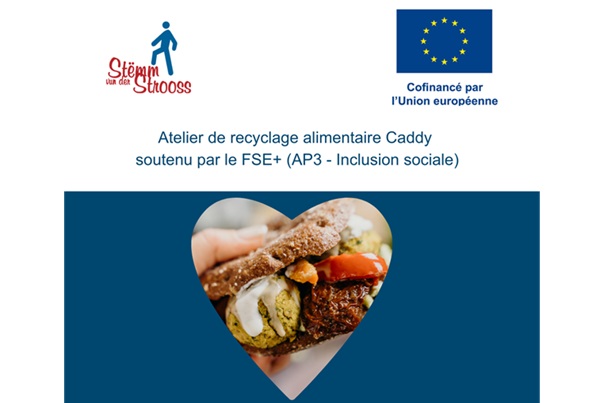
Stëmm vun der Strooss, a local non-profit organisation supporting people experiencing homelessness and vulnerable members of society, has announced that its "Caddy" vocational rehabilitation workshop will benefit from the European Social Fund (ESF) for the food recycling project.
Playing a leading role in the fight against poverty in the European Union, the ESF has already given its support for Stëmm vun der Strooss asbl in 2021, co-financing the salary of a graduate educator for two years as part of the social restaurant project in Esch-sur-Alzette. This co-financing was supplemented by financial support from Luxembourg’s Ministry of Labour.
Within the framework of socio-professional reintegration, Stëmm vun der Strooss noted it prioritises jobseekers who cannot or no longer access the primary job market for community workers (Travailleurs d'Utilité Collective – TUC) supported by the National Social Inclusion Office. The association aims to offer these jobseekers access to various professional workshops spread over several of their sites throughout the Grand Duchy.
These workshops are therefore aimed at people whose work environment needs to be adapted to help them rebuild their lives through therapeutic support for professional reintegration. To do this, Stëmm vun der Strooss first carries out an in-depth study of the person's medical, psychological and social problems, before moving on to the apprenticeship phase of vocational integration in their workshops. Team building, social cohesion, acceptance of authority, compliance with regulations such as hygiene and working hours and a non-confrontational relationship with others form part of the Stëmm vun der Strooss approach and reportedly enable the association to achieve objectives that benefit a population often sidelined by society.
Since 2014, the vocational rehabilitation workshop "Caddy" has been recycling edible food items removed from store shelves a few days before their expiration date. This type of waste becomes a source of food for those most in need of it. A partnership with a major hypermarket and a team of 43 people in vocational rehabilitation transform food products, under the supervision of chefs and educators, into fresh fruit juices, soups, raw vegetables, salads, sauces, sandwiches, sorbets, ready meals or food packs. This food is then redistributed free of charge to the underprivileged in the restaurants of the Stëmm vun der Strooss or to third-party associations that are also committed to helping people in precarious or impoverished situations.
Stëmm vun der Strooss emphasised it is the country’s main player in terms of food recycling for processing into food and dishes for direct consumption (141 tonnes in 2021 compared with 189 tonnes in 2023). The Caddy Stëmm workshop, in addition to providing a work opportunity to individuals in difficulty, dependent on others or far removed from the job market, helps contribute to the fight against poverty.
Stëmm vun der Strooss added that more and more people in Luxembourg are at risk of poverty. In the post-COVID period, the war in Ukraine and inflation are at the root of this risk. The first item that people in difficulty sacrifice to keep their heads above water financially is food, the association stressed. For this reason, Stëmm vun der Strooss chose to become involved in the process of food supply for a growing population tending towards poverty. In 2022, Stëmm vun der Strooss Asbl produced 123,516 meals, 27% more than in 2021, and more than 198,000 meals in 2023, up 34% compared with 2022.
To ensure that Stëmm vun der Strooss can continue to feed an ever-growing population, it aims to increase the quantities of recycled foodstuffs. To meet this challenge, the "Caddy" workshop moved to new premises at 5 rue Zone um Woeller in Sanem, in September 2022. Thanks to a more professional infrastructure, this goal is achievable and would enable the association to hire even more people in vocational rehabilitation, who will be able to regain a work rhythm and a team spirit and feel useful and exist in the eyes of society, the association stressed. This reinforcement of the capacities involves the hiring of an additional educator who supervises and trains people in vocational rehabilitation on a daily basis.
The association noted it could soon increase the volume of food to be processed from 189 tonnes in 2023 to 500 tonnes annually. Given the situation and their humanitarian objectives, an additional educator will be needed, according to Stëmm vun der Strooss.
Stëmm vun der Strooss expressed its gratitude to the European Social Fund for once again supporting the expansion of the organisation's humanitarian activities by co-financing 40% of the salary of a graduate educator for two years. This co-financing is also supplemented by financial support (60%) from the Ministry of Labour, the association added.








